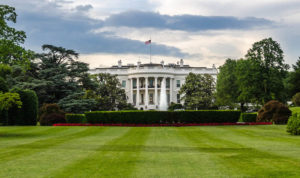
OPM issues guidance on enforcing the federal employee vaccine mandate, a federal judge blocks Texas’s abortion bill, and more…
IN THE NEWS
- The U.S. Office of Personnel Management (OPM) released guidance for agencies on enforcing the COVID-19 vaccine mandate for federal employees. OPM reminded agencies that individuals are considered fully vaccinated two weeks after receiving their final dose. OPM noted that agency employees should receive all their vaccine doses by November 8, 2021, to comply with the deadline. OPM stated that employees who refuse vaccination may be subject to disciplinary measures, including removal or termination, as soon as November 9, 2021. Still, OPM recommended that agencies begin enforcing the vaccine mandate “with counseling and education” for non-compliant employees.
- A federal judge blocked enforcement of Texas’s restrictive abortion bill, which bans abortions as early as six weeks into pregnancy. The judge condemned the state’s “unprecedented and transparent statutory scheme” for depriving individuals of the right to abortion before fetal viability. The judge ordered the state to display on court websites instructions that lawsuits to enforce the bill would “not be accepted by Texas courts.” Discussing the order, U.S. Attorney General Merrick Garland noted it was a “victory” for pregnant people in the state and for “the rule of law.” Texas filed an appeal to overturn the order.
- California Governor Gavin Newsom announced that California public schools will require middle and high school students to be vaccinated against COVID-19 to attend school in-person after the vaccine receives full U.S. Food and Drug Administration approval. Governor Newsom instructed the California Department of Public Health to add COVID-19 to the list of required vaccinations for in-person schooling, which includes measles, mumps, and rubella. The requirement will likely take effect for students in seventh grade or higher beginning on July 1, 2022. Governor Newsom stated that the requirement “is about protecting our children and school staff and keeping them in the classroom” and recommended that other states follow California’s lead.
- The Biden Administration proposed restoring parts of the regulations stemming from the National Environmental Policy Act. The White House Council on Environmental Quality’s proposal would restore three provisions that the Trump Administration modified in 2020. The Council’s proposal would require agencies to “evaluate all the relevant environmental impacts,” increase community input during the evaluation process, and set the Act’s rules as the minimum standards for environmental review rather than the maximum. The Biden Administration claimed that the proposal would help protect the environment and help workers build the “next generation of infrastructure.” Chad Whiteman of the U.S. Chamber of Commerce, reportedly opposed the proposal, stating that the Council’s proposal would “slow down building the infrastructure of the future.”
- In a 50-48 vote, the U.S. Senate confirmed Rohit Chopra, currently a commissioner of the U.S. Federal Trade Commission, as Director of the U.S. Consumer Finance Protection Bureau. Chopra is expected to tighten restrictions on the financial industry by scrutinizing credit reporting companies, payday lenders, and financial technology startups. After Chopra’s confirmation, Senator Sherrod Brown (D-OH), chairman of the U.S. Senate Committee on Banking, Housing, and Urban Affairs, stated that Chopra’s confirmation will enable the Bureau “to stand up to the biggest banks and the most powerful corporations to protect families, service members, students, and the elderly.”
- The U.S. Department of Health and Human Services announced a final rule that restores federal funding for family planning clinics that provide certain services, including abortion referrals. The final rule revoked a Trump Administration regulation that prevented clinics that provide abortion services from receiving federal family planning funds. Alexis McGill Johnson, the head of the Planned Parenthood Federation of America called the new rule “a major victory for patients, access to sexual and reproductive health care, and health equity.” Anti-abortion groups criticized the Biden Administration’s move, calling it an attempt to “funnel taxpayer dollars to abortion businesses.”
- The European Medicines Agency, the European Union’s drug regulator, allowed all adults 18 and over to receive booster shots for the COVID-19 vaccine at least six months after their second dose. The regulator also recommended an additional dose—which the European Medicines Agency differentiated from a booster shot—for immunocompromised individuals. Comparatively, in the United States, the Centers for Disease Control and Prevention has yet to authorize booster doses for all adults, although it has made additional doses available for adults who are especially at risk or who are 65 and older. The World Health Organization, meanwhile, advised that broad administration of booster doses could exacerbate “inequities in vaccine access” and cautioned that the introduction of booster shots should be “firmly evidence-driven.”
- The U.S. Fish and Wildlife Service proposed listing a Nevada desert flower, known as Tiehm’s buckwheat, under the Endangered Species Act. The flower only exists “across fewer than 10 acres in western Nevada.” The listing comes as environmentalists have advocated protecting the plant for years amid attempts by mining companies to develop lithium mines in the area, which would harm the flower. The proposed rule states that the Service will seek to designate the plant’s habitat as “critical,” which would restrict mining development and operations around the area.
WHAT WE’RE READING THIS WEEK
- In an article, Bronwyn E. Howell, lecturer at Victoria University of Wellington School of Management, and Petrus H. Potgeiter, professor at the University of South Africa, argued that cryptocurrencies should be self-regulated until more information is known about how its markets function. Potgeiter and Howell explained that cryptocurrencies should be treated differently than other financial products because consumers can transact crypto assets without central agency verification and transact internationally without a bank account. Potgeiter and Howell contended that formal regulations should not stifle the innovative qualities of crypto assets—such as their anonymous exchange. Instead, Potgeiter and Howell concluded that regulators must gain a deeper technical understanding of cryptocurrency so that they can create “clear and fair regulation.”
- In an article published by Resources magazine, Kevin Ankney, Ph.D. candidate in economics at Georgetown University, and his coauthors argued that government agencies, when writing fuel economy standards, should carefully evaluate the payback periods used to determine how much consumers are willing to pay for fuel savings. The authors noted that the National Highway Safety Administration and the U.S. Environmental Protection Agency, which issue fuel economy standards, consider 30 months of fuel cost savings when evaluating consumer behavior in purchasing vehicles. The authors concluded that studies differ on whether longer or shorter timeframes produce more accurate assessments of whether a rule effectively increases fuel economy compared to regular consumer behavior.
- In a recent working paper, Nikos Maragopoulos, associate researcher at the European Banking Institute, discussed the European Commission’s proposal for a European Green Bond Standard—a European Union-wide standard that encourages investment in green bonds and includes regulations such as setting “common definitions” for bonds. Maragopoulos argued that the current bond market does not allow investors to easily compare terms of the bonds and that the “development of a market for high quality green bonds” is crucial if the European Union is going to meet its climate and environmental policy goals. Maragopoulos concluded that the success of the green bond regulations is contingent upon “take-up among market participants” because the European Commission made the green bond standard voluntary rather than mandatory.
FLASHBACK FRIDAY
- In an essay in The Regulatory Review, Rachel Rebouché, professor at Temple University Beasley School of Law, argued that the constitutional standard for abortion restrictions was “in doubt” after the U.S. Supreme Court’s divided opinions in June Medical Services v. Russo, a case in which a Louisiana law made obtaining an abortion more challenging. Chief Justice Roberts’s concurrence, Rebouché argued, could produce an interpretation that permits abortion restrictions that provide no health benefits but do not pose a “substantial” burden on abortion access. Rebouché concluded that June Medical Services offers no real answer as to how much the effect of and intention behind an abortion restriction matters in determining a law’s constitutionality.



